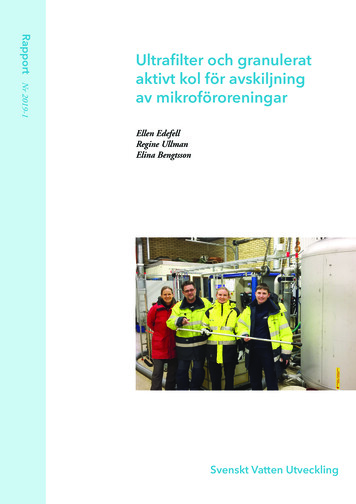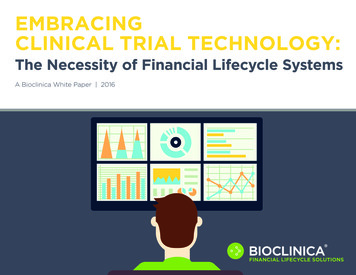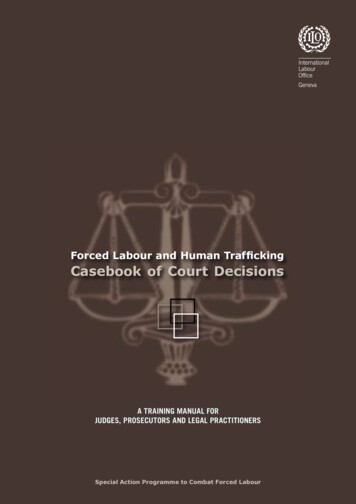
Transcription
S P E C I A L TO P I C S S E R I E SAmericanProsecutorsResearch InstituteBasicTrial Techniquesfor Prosecutors
American Prosecutors Research Institute99 Canal Center Plaza, Suite 510Alexandria,VA 22314www.ndaa-apri.orgThomas J. CharronPresidentRoger FlorenChief of StaffStephen K.TalpinsDirector, National Traffic Law CenterDebra WhitcombDirector, Grant Programs & DevelopmentGeorge RossDirector, Grants ManagementThis document was produced thanks to a charitable contribution from the Anheuser-BuschFoundation in St. Louis, Missouri. Its support in assisting local prosecutors’ fight against impaireddriving is greatly appreciated.This information is offered for educational purposes only and is notlegal advice. Points of view or opinions expressed in this document are those of the authors anddo not necessarily represent the official position of the Anheuser-Busch Foundation, the NationalDistrict Attorneys Association, or the American Prosecutors Research Institute. 2005 by the American Prosecutors Research Institute, the non-profit research, training andtechnical assistance affiliate of the National District Attorneys Association.
S P E C I A L TO P I C S S E R I E SBasicTrial Techniquesfor ProsecutorsMay 2005David I. GilbertAssistant State AttorneyMiami-Dade County State Attorney's OfficeMichael E. GilfarbAssistant State AttorneyMiami-Dade County State Attorney's OfficeStephen K.TalpinsDirector, National Traffic Law Center
D E D I C AT I O NOur efforts are dedicated to the hundreds of thousands of impaireddriving victims and their families and the thousands of professionals andadvocates working to alleviate the impaired driving problem.This monograph is dedicated to the following individuals for their tireless efforts to promote traffic safety:Mr. John BoboMr. Bobo is the United States Department of Transportation’s director ofDrug and Alcohol Policy and Compliance. Mr. Bobo previously served asdirector of the National Traffic Law Center (NTLC). As NTLC director,Mr. Bobo was nationally recognized for developing partnerships betweenprosecutors and other traffic safety partners and expanding NTLC’sscope. He also provided training and assistance to hundreds of prosecutors and law enforcement officers around the country, initiated themonograph series, published numerous articles and revised national training courses.Dr. Jack RichmanDr. Richman is a tenured full professor at the New England College ofOptometry. He is an internationally recognized expert in optometrywho has lectured around the world and published over 50 research andclinical articles and papers in professional journals and textbooks. Dr.Richman is a Standardized Field Sobriety Training (SFST) instructor andan associate Drug Recognition Expert (DRE) instructor who consultsand works with the Massachusetts State Police, Massachusetts CriminalJustice Training Council, the New Hampshire State Police TrainingAcademy and Institute of Police Technology and Management (IPTM).He also serves as the medical consultant to the International Associationof Chiefs of Police (IACP) National Highway Safety Committee’s DRETechnical Advisory Panel and as a police surgeon with the Marbleheadand Yarmouth Police Departments.iii
BASIC TRIAL TECHNIQUESFORPROSECUTORSSergeant Luis TabordaSergeant Taborda is a 13-year veteran of the Miami Police Department(MPD). Sergeant Taborda specializes in DUI and crash investigations.He is a certified Intoxilyzer 5000R breath test operator and agencyinspector and DRE. He is certified to teach officers about theStandardized Field Sobriety Tests (SFSTs), radar, traffic laser, driving andfirearms. Sergeant Taborda is a recognized expert in DRE/DUI and traffic crash investigations. Sergeant Taborda is, and always has been, dedicated to DUI enforcement. Miami-Dade Mothers Against Drunk Driving(MADD) bestowed its highest award, the “William Craig MemorialAward,” to Sergeant Taborda in 1999, MPD gave him an “AdministrativeAward of Excellence” in 2000 and Citizens Against Drug ImpairedDriving (C.A.N.D.I.D.) recognized him in 2002.ivA M E R I C A N P RO S E C U TO R S R E S E A R C H I N S T I T U T E
TA B L EOFCONTENTS1Introduction3Pre-Trial Preparation7General Trial Tips9Voir Dire (Jury Selection)23Opening25Case in Chief (Direct Examination)29Cross Examination35Closing(s)41Conclusionv
INTRODUCTION“Congratulations! Let me be the first to welcome you to theProsecutor’s Office. Here are your files. Lucky for you, crime is down.You only have 200 cases.Your courtroom is across the street. Goodluck!” In many resource-strapped offices, this suffices for prosecutortraining.Many offices assign Driving Under the Influence (DUI)1 cases to theirmost inexperienced prosecutors.Yet DUIs can be as difficult to win ashomicide cases. DUI cases involve all types of evidence, including eyewitness testimony, documentary and other physical evidence, lay opiniontestimony, scientific evidence, expert testimony and an almost infinitenumber of complex issues. DUI prosecutors must be familiar with thesevarious types of evidence and the rules governing their admission at trial.They also must learn to captivate their audience (the jury) and presenttheir cases convincingly, in a manner the jury can relate to and understand.Every attorney and every case is unique; there are very few hard and fastcourtroom techniques and strategies.You must develop your own styleand adapt your strategy to each individual case. However, there are maxims or guidelines you should consider in developing your own style andstrategies. This monograph is designed to assist you to make appropriate,informed decisions, by providing differing perspectives, examples andtips. As you read it, be mindful that your jurisdiction may have rules,statutes or case law that prohibit you from employing some of thesetechniques.21 Some states refer to DUI as Driving While Intoxicated or Driving While Impaired (DWI).2 American Prosecutors Research Institute’s (APRI) National Traffic Law Center (NTLC) attorneysare available to assist you if you have questions or want further assistance. You may contact theNTLC at (703) 549-4235.
P R E - T R I A L P R E PA R AT I O NA successful trial starts long before the venire3 is brought in. Simplystated, preparation is the key to victory. You must thoroughly familiarizeyourself with the evidence, case strengths and weaknesses, and the lawbefore selecting a jury.ThemeOne of the most important strategy decisions you make is selecting aproper theme. The theme is the general storyline of your case. Choose atheme that resonates with the average person. Whenever possible, choosea theme that motivates your jury to convict.Create a catch phrase that captures your theme that you can usethroughout the trial. Advertisements, quotation dictionaries, slogans andproverbs can be helpful. You should be able to present your theme in afew short words or phrases. An easy way to start developing a theme isto say “This is a case about .” and finish that phrase.Practice Tips: DUI Themes and Catch PhrasesTypical DUI themes revolve around responsibility andconsequences. Examples include: “On , the defendant made some choices. Nowhe must bear the consequences.” “You drink. You drive. You lose.”4 “The car came fully loaded. So did the defendant.”5 “The defendant didn’t control his drinking, so he couldn’t control his driving.”3 In many jurisdictions, the courts refer to prospective jury panels as “venires” and prospectivejurors as “venire persons.” This terminology is not universal.4 National Highway Traffic Safety Administration (NHTSA) anti-DUI campaign slogan(2003-2005).5 Mothers Against Drunk Driving slogan (2000).3
BASIC TRIAL TECHNIQUESFORPROSECUTORSStructureYour presentation should tell your story in a clear, concise fashion. It maybe easiest to present the witnesses and evidence in chronological order.An alternative, more dramatic method is to start and end the case in chiefwith your strongest witnesses, saving your best piece of evidence for last.EvidencePre-plan your strategy for proving your case. Do not introduce evidencesimply because you have it. For example, consider not calling witnesseswho do not advance your theme or argument. The more witnesses youcall, the greater the likelihood of introducing unnecessary conflicts in theevidence. Sometimes, less really is more.Determine how to introduce the evidence you want to present. Reviewapplicable statutes and available predicate manuals, and seek guidancefrom more senior prosecutors. Remember also that you are obligated toprovide the defense with exculpatory evidence.6Practice Tip: Introducing EvidenceList all of the evidence you want to admit. Write down the rules oflaw and the name(s) of the witness(es) that will allow you to introducethe evidence. Leave space to check off the predicates and the evidenceas you proceed through the relevant examination(s). For example:EvidenceWitness(es)Applicable RulesBreathCardOperatorAdministrative rulesMaintenance Breath test checklistOfficerBusiness recordsexceptionPublic records exceptionCompleted AdmittedThis will help you stay focused during trial and ensure that yousucceed in admitting the evidence.6 Brady v. Maryland, 373 U.S. 83, 10 L. Ed. 2d 215, 83 S. Ct. 1194 (1963).4A M E R I C A N P RO S E C U TO R S R E S E A R C H I N S T I T U T E
P R E - T R I A L P R E PA R AT I O NCarefully review all case documents and prepare (or pre-try) each witness. Identify clearly inadmissible evidence and instruct your witnesses torefrain from mentioning it. Examples of inadmissible evidence includeprior bad acts, character and propensity evidence, and statements taken incontravention of Miranda. Identify possibly inadmissible evidence andraise it with the court pre-trial via a motion in limine.Identify potential conflicts in the evidence and either resolve them ordetermine ways to explain them.DefensesAnticipate and prepare for all possible defenses and arguments. This really is a much simpler task than it sounds. There are only a few commondefenses in any criminal case:A. Identity or ID (frequently referred to as SODDI, or “SomeOther Dude Did It”)B. “The evidence proves I’m innocent” (including defenses ofinsanity, necessity and self-defense)C.The State cannot prove its case because:1.There is a “lack of evidence”i.There is only one witnessii.There is no (or very little) corroborating physicalor scientific evidenceiii.The evidence is not credible or trustworthy:a.The witnesses are lyingb.The police are corrupt, prejudiced or ineptc.The analyst, technician, doctor or scientist is notqualified or made a mistake (the evidence is notreliable)2.There are conflicts in the evidence.5
BASIC TRIAL TECHNIQUESFORPROSECUTORSFor information regarding common defenses in DUI cases, seeOvercoming Impaired Driving Defenses, http://www.ndaaapri.org/pdf/overcoming impaired driving defenses.pdf (APRI’sNational Traffic Law Center 2004).Practice Tips: DUI Crash CasesIn crash cases, be ready for defense claims that the defendantconsumed alcohol after the crash occurred.The JudgeFamiliarize yourself with the judge and adjust your strategy and styleaccordingly. Does the judge allow speaking objections, need case lawbefore ruling on legal issues, or impose time limits or other constraintson voir dire, opening or closing?Always treat the judge with respect. Jurors tend to dislike attorneys whoare sarcastic or overly critical of the court. As a general rule, refrain fromrolling your eyes or otherwise reacting to adverse rulings.Defense CounselSimilarly, you should consider defense counsel’s style. If you do notknow the defense attorney, ask your colleagues for their impressions. Ifyou know that defense counsel likes to ask inappropriate questions in voirdire, introduce inadmissible evidence or make inappropriate arguments,file an expansive motion in limine asking the judge for restrictions.Ask for Help!Perhaps most importantly, do not try to reinvent the wheel until youbecome comfortable in court. Consult with experienced prosecutors andask them for assistance and guidance. Contact the NTLC for predicatequestions, case law and sample briefs.6A M E R I C A N P RO S E C U TO R S R E S E A R C H I N S T I T U T E
GENERAL TRIAL TIPSGenerallyMost jurors want to reach a fair and just decision. Your job is to helpthem achieve that goal by finding the defendant guilty.7 You must sellyourself and your case. If you do not understand the case, or cannotexplain it, you cannot sell it.Jurors expect prosecutors to be fair and honest. If you fail to meet thisexpectation, you will assuredly lose and face appropriate discipline fromthe state bar association.Try to refrain from objecting to evidence thatdoes not hurt your case significantly. If you object too much it will lookas if you are hiding something (especially if the judge overrules yourobjections). If defense counsel is particularly abrasive, you may want tomake his lack of professionalism more obvious by being especially cordialin front of the jury.Remember that whatever happens in the courtroom, the jurors arealways watching. How you look, how you sit, how you interact witheveryone in the courtroom, and how your desk appears, all make animpression with the jury.Because people have different skills and learn differently, try to involve asmany senses as possible during trial. Whenever possible, do not just tellthe jury about the evidence. Let the jury see, touch and smell the evidence, if you can, through every stage of the trial.Jurors are inundated by crime-dramas in the popular media that createunrealistic expectations of police officers, prosecutors and judges. Manytruly believe that crime scene investigators solve crimes in 60 minutes orless using high tech scientific techniques. Obviously, this is not the case.Still, you should strive to meet the jurors’ expectations whenever possible.7 As a prosecutor, your job is to seek justice, not to convict everyone the police arrest. You mustnever try a defendant for a crime unless you are convinced the defendant committed it.7
BASIC TRIAL TECHNIQUESFORPROSECUTORSFinally, be cognizant of the record. Your victory will be meaningless ifyou lose on appeal. Make sure that all relevant conversations take placeon the record and that the court reporter can hear everything.In presenting your cases, remember this empowering fact: truth is onyour side. Jurors may have some difficulty understanding all of the evidence, particularly if the defense introduces expert testimony. However,jurors are very good at recognizing sincerity. Therefore, you must beyourself. Speak to them as colleagues, not students. Believe in your caseand give the jurors reason to believe in you.8A M E R I C A N P RO S E C U TO R S R E S E A R C H I N S T I T U T E
VO I R D I R E ( J U RY S E L E C T I O N )In some jurisdictions, prosecutors are permitted to voir dire or questionprospective jurors or venire persons. If you practice in a jurisdiction thatpermits you to ask questions, it is important to develop an effective voirdire.This requires thorough preparation. Carefully identify and anticipateall potential issues and defenses. To accomplish this, you must understandthe jury selection rules and the law of your case.You have an unlimited number of cause challenges.The purpose of causechallenges is to eliminate jurors who cannot be fair and impartial. Ajudge will grant a cause strike if the judge has a reasonable doubt aboutthe venire person’s ability to be fair. Still, you should use your cause challenges wisely and fairly to avoid sacrificing your credibility with thecourt.You have a limited number of peremptory challenges.The number variesaccording to jurisdiction and crime. Know how many peremptory challenges you get so that you may use them appropriately.You may exerciseyour peremptory challenges on whomever you wish, provided you donot use them in a discriminatory manner. Whenever you challenge avenire person who is a member of a suspect or protected class, be prepared to provide the court with a logical reason to strike the venire person. The basis for your strike need not rise to the level of cause (or evencome close), but it must be articulable and legitimate.If you have time, obtain each venire person’s criminal record. In MiamiDade County, prosecutors found that at least one potential juror onalmost every panel misrepresented his or her criminal past.Jury selection really is a de-selection process in which both parties eliminate the worst jurors for their cases.Your goals are to inform the venirepersons of the charges, establish your theme, build a rapport with theindividual venire persons, and to identify venire persons who are (1)biased or prejudiced against the police, you or your office, the case or thevictim; and/or (2) sympathetic or empathic toward the defendant.9
BASIC TRIAL TECHNIQUESFORPROSECUTORSTo achieve these goals, try to encourage and obtain active juror participation. It may be helpful to underscore the people’s right to a fair jury andcompare jury selection to a hiring process. Consider the follow litany ofquestions and statements:Ms. Jones, you indicated earlier that you are a supervisor withX Corporation?Do you participate in the hiring process?(If no, move on to another juror. If yes, ask the following questions)Can you describe the procedure for the jury? How long doesthe entire process take?Wow. That’s quite a process. It’s similar to what we’re trying todo here.We’re trying to hire or select a jury that can appropriatelydecide this case. Only we don’t get weeks like your company does.You understand that this case is just as important to the peopleof the State of Z as your hiring decisions are to you?Can you appreciate how difficult our job is?That’s why we need your help. That’s why it’s so important foreach and every one of you to actively participate in this process.Can you all do this?Warn the jurors that you may have to ask them some personal questionsand advise them that they can ask for a sidebar if they do not feel comfortable answering any of the questions in front of the larger group. Tellthem that you do not mean to intrude on their privacy, but you want toensure a fair and just result in your case.Still, you may find it best to start with general questions about work orother common topics before going to more personal matters. This will10A M E R I C A N P RO S E C U TO R S R E S E A R C H I N S T I T U T E
V O I R D I R E ( J U RY S E L E C T I O N )allow you to establish a rapport with the jurors before you ask the moredifficult questions. Try to speak to them in a conversational tone, as ifyou were having a chat with them in your living room.Nobody wants to acknowledge being prejudiced or unfair. Accordingly,probe the jurors’ thoughts and feelings by asking hypothetical questionson issues that directly and substantially impact on a venire person’s abilityto view the evidence fairly or make a proper decision.Try to learn the venire persons’ names. Try to speak to each of them.LISTEN to their answers. This will convey the message that you valuethem and their opinions.The most skilled trial attorneys tailor their questions to the facts of thecase at bar. Still, there are certain areas you should cover in virtuallyevery trial if you have enough time. Consider the following issues andways to question people about them:8Right to a Fair TrialIssue:Most people understand that defendants have a right to a fair trial.Unfortunately, people often forget that the people also have a right to afair trial.Example:Everyone knows that the defendant has a right to a fair trial. Do youunderstand that the people of the state of also have the rightto a fair trial?Ability to Follow the LawIssue:Some people will not abide by the law if they do not believe in it. Thesepeople should be removed for cause.8 The law varies from jurisdiction to jurisdiction. Do not use any of the below listed examples untilyou verify that you can do so in your jurisdiction.11
BASIC TRIAL TECHNIQUESFORPROSECUTORSExample:We all know that it’s against the law to exceed the speed limit on ourhighways. Many otherwise law-abiding people break that law daily.What we choose to do on the streets is different from what we must doin the courtroom. You, as jurors, will have a special responsibility to follow our laws.Mr. , let’s suppose you sat on a speeding case in which the driverwas charged with traveling five miles over the speed limit. A police officer testified and convinced you of the driver’s guilt beyond a reasonabledoubt. What would your verdict be?Why?Legal DefinitionsIssue:Many venire persons believe that they know the law based on their ownexperiences, conversations with friends and lawyers, and television. Theymay misunderstand legal terms that we, as lawyers, take for granted. Forexample, many jurors will be shocked to learn that a person can be guiltyof certain impaired driving offenses even if he or she was under the legallimit.Example:As many of you know, the law sometimes defines things differently fromthe rest of us. Let me give you an example.Mr. , can you name some deadly weapons for me?(Venire persons typically name guns, knives, etc.)Would it surprise you to know that the court may consider this (hold upa pen) a deadly weapon, depending on how it is used?12A M E R I C A N P RO S E C U TO R S R E S E A R C H I N S T I T U T E
V O I R D I R E ( J U RY S E L E C T I O N )Can you promise to keep an open mind and use the legal definitions thatthe judge gives you?Reasonable Doubt: Quality versus QuantityIssue:Deluged by recent newspaper articles about exonerations and not guiltyverdicts, many venire persons are reluctant to find someone guilty in theabsence of overwhelming evidence. Thus, juries that believe defendantsare guilty often acquit them “because there just wasn’t enough evidence.”This outcome is particularly likely in cases involving a single witness orlittle or no physical evidence. It is imperative that you explain to thepotential jurors that your burden revolves around the quality of the evidence, not the quantity.Example:It’s my burden to prove the defendant guilty beyond a reasonable doubt,a burden I willingly accept.Mrs. , let’s suppose I bring you two boxes of evidence andthree witnesses. You look at all of the evidence; you listen carefully to thewitnesses.You don’t believe any of it. What’s your verdict?Now let’s suppose I bring you 100 boxes of evidence and parade in athousand witnesses. Relax, I promise that’s not going to happen. We’llget out of here during our lifetimes. But let’s suppose we had all thetime in the world and I spent one year presenting you with truckloadsof materials. Let’s say you didn’t believe any of it. What would yourverdict be?Let’s change things a bit. Let’s suppose I bring in only one witness. Youlisten carefully to that witness. You know that the witness is telling thetruth. You believe the witness beyond a reasonable doubt. What wouldyour verdict be?13
BASIC TRIAL TECHNIQUESFORPROSECUTORSLack of EvidenceIssue:The judge will instruct the jury that reasonable doubt can come from alack of evidence. Savvy defense attorneys rely on this instruction to convince some jurors that the police must conduct every possible test andthat you must introduce every possible piece of evidence.Example:Continuing the above quality versus quantity hypothetical, you mightask:What if other witnesses were available and I didn’t call them?Would that change your verdict?ORWhat if the officer could have taken DNA swabs but didn’t?Would that change your verdict?(If a venire person answers any of these questions in the affirmative,remind the juror that the issue revolves around quality, not quantity.If a juror persists in this misunderstanding, try another hypothetical.For example, would the juror expect you to call 70,000 witnesses ifa crime occurred at a local football or baseball game?)Conflicts in the EvidenceIssue:The judge will instruct the jury that reasonable doubt can come fromconflicts in the evidence. If you call more than one witness, they willinvariably testify differently, creating real or perceived conflicts in theevidence. Most discrepancies are meaningless (unless they are sufficientto cause the jury to question the veracity of the witnesses or they directly pertain to the elements of the case). Still, the defense will highlight thedifferences, claim they establish a reasonable doubt, and attempt to con-14A M E R I C A N P RO S E C U TO R S R E S E A R C H I N S T I T U T E
V O I R D I R E ( J U RY S E L E C T I O N )vince the jurors that you must prove every fact in the case, rather than theelements of the charge. It is imperative that you explain this distinction tothe venire panel.Example:One of the most effective examples is the “Wedding Hypo”:Has everyone here been to a wedding?Mrs. , you’ve been to a wedding before?How many?You know how everyone always sits around and talks about the brideand groom?Let’s say that you get there a little late. You sit at your table and ask theother guests how it has been. Everyone starts talking about how manytimes the bride and groom kissed. One person says, “I saw them kiss fivetimes.” Another says, “I saw them kiss three times.” A third person says,“I saw them kiss two times.” Based on their comments alone, could youdetermine how many times they kissed?Of course not, because they cannot agree.Does that make them all liars?Why not?(You should elicit testimony or explain that people see things differentlybecause they may not pay attention to the same things, may not noticethings at the same time, may be looking at things from a different angle,and so on.)Now let’s say that the issue was not how many times they kissed, butwhether they kissed at all. Can you make that determination?15
BASIC TRIAL TECHNIQUESFORPROSECUTORSOf course, because everyone agrees they kissed.9It would be silly to conclude that they did not kiss at all simplybecause people cannot agree on the number of times they kissed.Can you see how conflicts in the testimony are just a natural consequence of real life?Physical versus Testimonial EvidenceIssue:Some people are so distrustful of others that they cannot reach a decisionbased upon someone’s word alone. Jurors who require physical evidencein all cases are subject to challenges for cause.Example:Just as the law does not require a certain amount of evidence, it also doesnot require a certain type of evidence. Does that make sense to everyone?For example, the law does not weigh testimonial evidence (what a witness says) and physical evidence (things the police may find) differently.Does anyone have a problem with that?Mr. , let’s suppose the defendant was charged with a noiseordinance violation. Would you expect any physical evidence?(Depending on your jury, you may use similar hypotheticals involvingsexual harassment, non-forcible rape, theft, and so on. In appropriatecases, you also may want to comment that criminals typically do notcommit crimes where they expect to be observed, and that we wouldexpect anyone who commits a crime to destroy evidence to avoid beingcaught. Encourage the venire persons to use their common sense; theyshould not expect DNA evidence in a DUI case where identity is not anissue.)9 Some prosecutors use a variation on this hypothetical by asking additional questions about a person who did not see them kiss (but was not paying attention to them).16A M E R I C A N P RO S E C U TO R S R E S E A R C H I N S T I T U T E
V O I R D I R E ( J U RY S E L E C T I O N )A Lawyer’s QuestionsIssue:Defense attorneys sometimes mislead jurors by creating or suggestingnon-existent facts or evidence through their questions. Rather thanattack the defense attorney, try to address the issue in a more subtle manner.Example:The judge is going to tell you that what a lawyer says is not evidence.Understanding that, can you tell me the difference between these twoquestions:What color was the car?Was the car blue?(By phrasing the comment and questions that way, you will alert the jurythat there is a difference while simultaneously avoiding objection.)After a juror explains the obvious difference between the questions, askthe juror:What if I ask a witness, “Isn’t it true the car was blue?” and the witnessanswers, “No, the car was red.”What is the evidence in the case?(The evidence is that the car is red because that is what the witness said.)How many people think there is a conflict in the evidence?(The number of people who think there is a conflict may surprise you.At this point, choose a juror who understands that there is no conflictbecause what the lawyer says or asks is not evidence and ask that juror toexplain it to the panel.)Police OfficersIssue:Some jurors may be biased against police officers because of their own17
BASIC TRIAL TECHNIQUESFORPROSECUTORSbad experiences or because of the extensive media attention given topolice errors and misconduct. It is imperative that you identify and eliminate jurors who may be unwilling to fairly assess police testimony.Example:Has anyone ever had a bad experience with a police officer?Has anyone ever gotten a traffic ticket?Do any of you feel that you didn’t deserve that ticket or tickets?Mr. , can you please tell us about that?Practice Tips: DUI Specific Issues to Cover in Voir Dire Attitudes about drinking Do you drink? For those of you who do not, why not? Will your practices or beliefs prevent you fromdetermining whether the defendant drove whileimpaired? Driving Is there anyone here who does not drive? Why not? Would that prevent you from fairly determiningwhether the defendant drove with a blood alcohollevel over the legal limit or while impaired in thiscase? Attitudes about drinking and driving The law does not prevent people from drinking and driving.The law prevent
D EDICATION Our efforts are dedicated to the hundreds of thousands of impaired driving victims and their families and the thousands of professionals and advocates working to alleviate the impaired driving problem. This monograph is dedicated to the following individuals for their tire-











